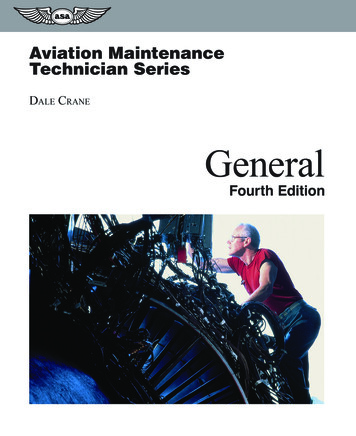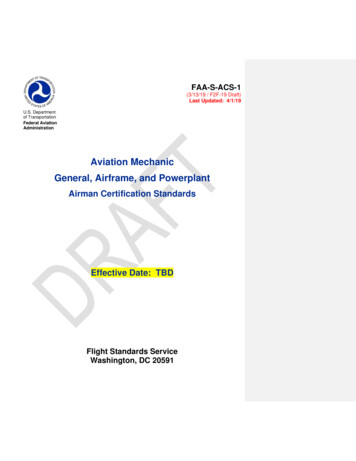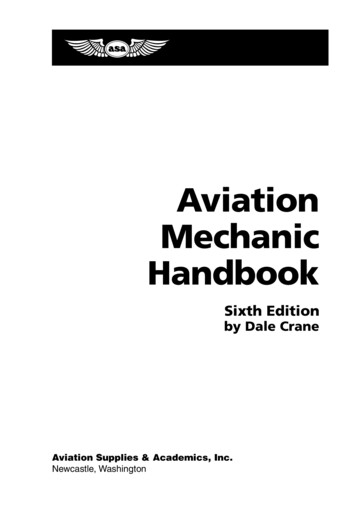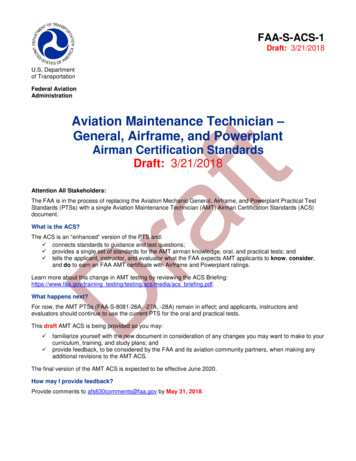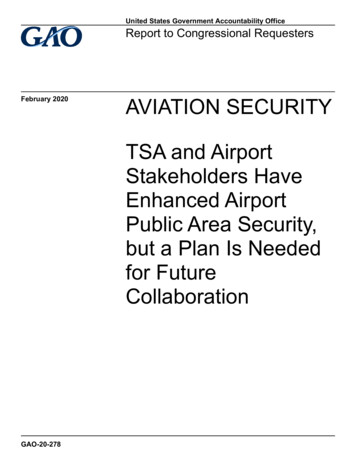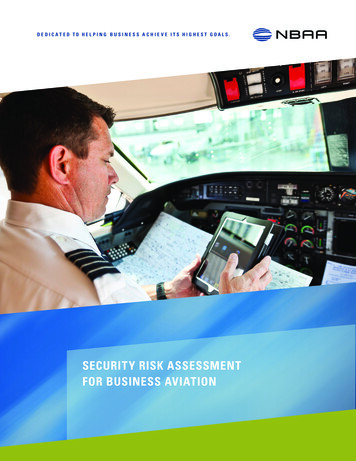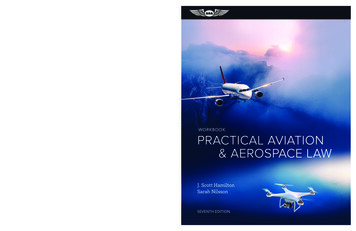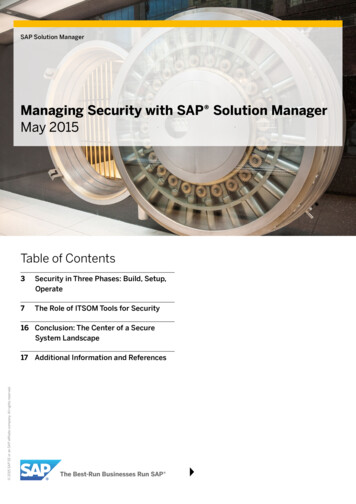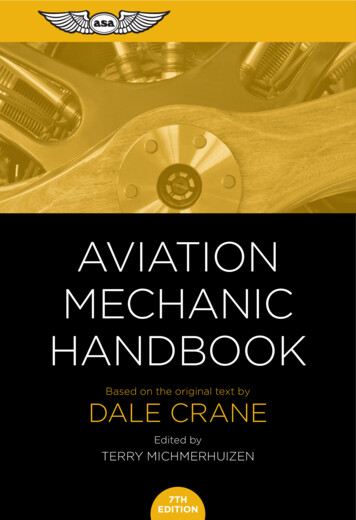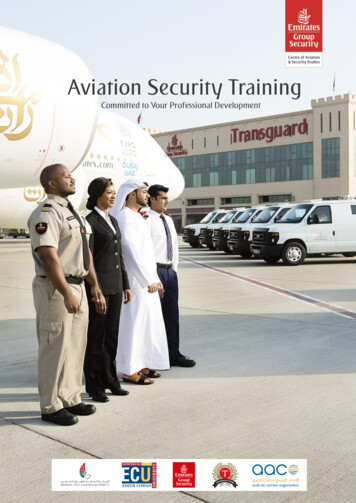
Transcription
Aviation Security TrainingCommitted to Your Professional Development
ContentsPreface3About CASS5Introduction to CASS Programmes6University Diploma in Aviation Security Management7University Diploma in Aviation Ground Handling8Introduction to Aviation Security Ground Training Courses9Airline Security Induction Course (without practical lessons)10Basic Airline Security Course11Deportee/Escort Security Training12US Flight SOP Contact Training Initial13US Flight SOP Non Contact Training Initial14Travel Document Check Course (Basic)15Travel Document Check Course (Advanced)16Basic Airline Security Course (Basic on ICAO ASTP)17Cargo Security Management Course (Basic on ICAO Material)19National Inspector Course (Basic on ICAO Material)20Crisis Management Course (Basic on ICAO Material)21AVSEC Instructor Course (Basic on ICAO Material)22Security Risk Assessment Course23Fire Safety Training24First Aid Training25Introduction to Aircrew Security Courses26AVSEC Ab Initio (Cabin Crew only)27AVSEC Recurrent (Cabin Crew only)28Advanced Restraint Techniques (ART) Train the Trainer29Advanced Control Techniques (ACT) Train the Trainer302
PrefaceHH Sheikh Ahmed Bin Saeed Al MaktoumChairman, Emirates GroupEmirates Airlines and Dubai Airport haveachieved an amazing growth over the last20 years and that’s all due to the highstandards of security.This safe, secure environment has beenmade possible by the Group Securityfocusing on education and training.3
4
About CASSIn November 2001, Emirates Group Security’s trainingteams enhanced Dubai’s reputation as a centre ofexcellence for aviation and security training within theregion. The Centre of Aviation and Security pment arm of Emirates Group Security toprovide security training for aviation professionals.CASS manages a portfolio of education courses foraviation security to support the continued professionaldevelopment of staff in the Emirates Group andpartner organizations.The Centre is home to diploma programs run by EdithCowan University (ECU) and approved courses byGCAA. These include the University Diploma inAviation Security Management and the UniversityDiploma in GroundHandling. These diplomas areaccredited under the Australian and CommonwealthUniversity Guidelines.CASS operates state-of-the-art classrooms with variouscapacities to accommodate different training needs. Ithas a range of AV equipment and all classrooms aredesigned to meet ICAO and GCAA requirements.Computer-Based Training (CBT) classrooms are alsoavailable for advanced aviation security trainingprograms, such as, the X-Ray Certification Course forscreeners.Constantly working alongside industry-leading securityexperts who are highly regarded throughout the world,CASS is also developing a research capacity within theaim of becoming a regional hub for research insecurity and aviation. The Centre will be home toseveral research projects in this field and will workwith collaborators from UK, Australia and Singapore.The research element of CASS will be developedfurther over the next few years.5
Introduction toCASSProgrammesAviation industry has been developing at a record pacethroughout the world. Under such active environment airportoperations and security are the most critical elements thatneed managed efficiently within the dynamics the industry.With the unprecedented introduction of security reforms andconstant emergence of new security trends over the lastdecade, it is imperative for current and potential aviationprofessionals to keep abreast of security innovations.The passenger and cargo traffic movement at airports holdsthe key to operational efficiency, thus making it vital toensure compliance to industry standards through the smoothoperation of passenger handling, baggage handling andlogistics.We have developed industry-focused programmes designed toprovide in-depth understanding and development of the skillsnecessary to successfully manage ground handling operationsand security needs in the aviation industry.These part time programmes are relevant to workingprofessionals who wish to fast-track their career prospects.The diploma is awarded by Edith Cowan University ofAustralia (ECU) and attracts internationally-recognised creditpoints.6
University Diplomain Aviation SecurityManagementDuration: 18 monthsOverview:This programme is designed to provide an in-depthunderstanding of the key requirements and skillsnecessary to successfully manage security needs in theaviation industry. It includes security threats, controls,cargo security, passenger security, intelligence, crisismanagement, and post-incident recovery.This industry-based course includes six modules taughtby expert practitioners from within the industry andacademics, with examination assessment and gradingundertaken by Edith Cowan University (ECU).The part-time programme is relevant to workingprofessionals who wish to fast-track their careerprospects.The diploma is awarded by Edith Cowan University ofAustralia (ECU) and attracts internationally-recognisedcredit points for future courses.Objectives:Train aviation personnel to plan, co-ordinate andimplement the application of airport security measuresand compliance.Pre-requisite/ EligibilityHigh School certification equivalent to Australian Year12 or two years work experience in a related field andEnglish proficiency (IELTS/TOEFL)Mode of deliveryLectures & tutorialsAssessment Assignments Exams ProjectCourse UnitsSCY1104 Introduction to aviation securitySCY1205 Safeguarding the aviation industrySCY1206 Aviation security operationsSCY1307 Managing aviation incidents and threatsSCY 1109 AVSEC work-based project placementSCY 1209 AVSEC professional placement77
University Diplomain Aviation GroundHandlingDuration: 18 monthsOverview:This programme offers industry-focused subjects onground handling operations and management,contemporary aviation issues, safeguarding the aviationindustry, aviation logistics and passenger handlingservices.This course encapsulates the fundamentals of groundhandling including ramp, baggage, airside load, security,catering, labour and equipment, along with developingpractical management skills.This industry-based course includes eight modules,taught by expert practitioners from within the industryand academics, with examination assessment and gradingundertaken by Edith Cowan University (ECU).Pre-requisite/ EligibilityThe part-time programme is relevant to workingprofessionals who wish to fast-track their careerprospects.High School certification equivalent to AustralianYear 12 or two years work experience in a relatedfield and English proficiency (IELTS/TOEFL)The diploma is awarded by Edith Cowan University ofAustralia (ECU) and attracts internationally-recognisedcredit points for future courses.Mode of deliveryLectures & tutorialsObjectives:For aviation professionals to keep abreast of changes inAssessment Assignments Exams Projectprocedures and technology in order to achieve thehighest degree of operational delivery efficiency andeffectiveness.Course UnitsSCA 1231 Introduction to Ground HandlingSCA 1232 Contemporary Aviation IssuesSCY 0205 Safeguarding the Aviation IndustrySCA 1233 Ground Handling Operations & ManagementSCA 1234 Aviation LogisticsSCA 1235 Handling Passenger ServicesSCA 1236 Individual Project - 1 (proposal)SCA 1237 Individual Project - 2 (final thesis)88
Introduction toAviation SecurityGround TrainingCoursesThe Ground Training Security courses are designed totrain security supervisors of all disciplines and tochallenge existing aviation professionals to meet currentindustry standards, best practices and new procedures.With our trainers’ experience in ground security, we canprovide a number of unique courses that meet GCAArequirements – adding value to your operations.The following aviation security courses are available toall professionals in the aviation security or relatedindustries.These basic and advanced management courses run on amodular basis which can be tailor-made to suit yourrequirements.9
Airline Security InductionCourseDuration: 15 daysOverview:The course is designed for Emirates Group Security or forapproved service providers, new recruits, who will beworking at airports and who have to understand,implement or enforce aviation security operations.Objectives:To equip personnel with the fundamental knowledge onaviation and general security skills to enable them todischarge their duties effectively. The course is also anorientation program to the trainees not only dealing onthe professional knowledge on AVSEC but also their rolein Quality Management.Contents:Day 1— Basic SecuritySecurity OrganizationCultural and Quality AwarenessConflict ResolutionPatrolling, Guarding & Radio ProcedureReport WritingEthics and ProfessionalismDay 2— Aviation Security Level 1Introduction to Aviation SecurityThreats & Risks to Civil AviationPassenger and Baggage SecurityDay 3— Aviation Security Level 1Bombs and ExplosivesX-ray Examination of Baggage & Security EquipmentProtection of Parked AircraftCrime PreventionBomb Threat ManagementDay 4— Intermediate AVSEC Profiler Course(Non-Contact Security)Introduction to Security ProfilingAl Qaeda – The Global ReachRisk AnalysisTerrorism: Methods of OperationDay 5 — Basic SecuritySecurity ConceptWeapons & Explosives (Recap)Baggage Room ObserverRamp Security PositionsInspection of PersonsDay 6Aircraft Cabin SearchEmergency ResponseCargo & Catering SecurityEmployee IdentificationEmergency ResponseDay 7 — SOP Training – Cargo & Aircraft ProtectionRamp Operations and Securing Sterile Holding AreasCheck In CountersMake Up/Interline Baggage monitoring & escortingBoarding gate checksAircraft access controlAircraft Cabin SearchAircraft Guarding & VigilanceCargo EscortingDay 8 — SOP Training – Cargo & Aircraft ProtectionCargo OperationsTypes of CargoAreas manned by security in the warehouseDuties of warehouse securityDuties of warehouse police and customsRadio CommunicationsAccess Control of Vehicles1010
Basic Airline SecurityCourse (without practical lessons)Duration: 5 daysOverview:Accredited by the General Civil Aviation Authority of theUAE, this course is the basic foundation of the securitytraining requirements for all security staff workingwithin the airport environment including securitysupervisors and managers.Objectives:The course is designed for Emirates Group Security orfor approved service providers who will be working atairports and who have to understand, implement orenforceaviationsecurityoperations.Contents:Day 1— Aviation Security Level 1Introduction to Aviation SecurityThreats & Risks to Civil AviationPassenger and Baggage SecurityDay 2— Aviation Security Level 1Bombs and ExplosivesX-ray Examination of Baggage & Security EquipmentProtection of Parked AircraftCrime PreventionBomb Threat ManagementDay 3— Intermediate AVSEC Profiler Course(Non-Contact Security)Introduction to Security ProfilingCivil Aviation as an Attractive TargetAl Qaeda – The Global ReachRisk AnalysisTerrorism: Methods of OperationDay 4Security ConceptWeapons & Explosives (Recap)Baggage Room ObserverRamp Security PositionsInspection of PersonsDay 5Aircraft Cabin SearchEmergency ResponseCargo & Catering SecurityEmployee IdentificationEmergency Response1111
Deportee/Escort SecurityTrainingDuration: 1 dayOverview:This programme is designed for in-flight security officers/sky marshals undertaking security of the aircraft againstacts of unlawful interference.Objectives:To provide an in-depth knowledge on deportee escortprocedures and inadmissible passenger with respect toAnnex 17 and Annex 9, as well as how to conduct a riskassessment and various self-defense and restrainingtechniques.Course UnitsWhat is a deportee?What is an ‘inadmissible passenger’?Rules of engagementAnnex 17 legislation on escorting unruly passengersAnnex 9 legislation on escorting unruly passengersHow to conduct a risk assessmentLiability factor (airline/state)Self-defense techniquesRestraining techniquesPre-requisiteNoneMode of deliveryClassroom lectures, practical sessions on self-defence andrestraining techniques analysing all the possible risks thata deportee/escort personnel may face during a mission.AssessmentWritten/Practical examination1212
US Flight SOPContact Training InitialDuration: 5 daysOverview:The course has been designed to enable selected airportsecurity personnel to handle document examination, passenger security through critical, suspicious and positivesigns, stages of screening, passenger classification andselectee search procedures.Contents:Day 1AOSSPImportant Terminologies and DefinitionsThreats to Civil AviationTypes of PassengersPassenger Profiles (Diagram)Airline TicketPassportPassport Examination GuideTypes of Passport FraudDay 2Passenger Security Handling1. Critical Signs2. Suspicious Signs - Appearance and Behaviour- Documentation3. Positive SignsGuides to Asking QuestionsStages of ScreeningLogic Behind the SIGNS and how to resolve it1. Appearance and Behaviour2. DocumentationDay 3Mandatory Baggage Control QuestionsTSA DirectivesCurrent TSA DirectivesPassenger ClassificationProfiling Flow ChartDay 4Passenger Classification: ContinuationRole Play: Stages of ScreeningDay 5Selectee Search Procedures1. Selectee Baggage Search2. Selectee Carry on Search3. Body SearchSelectee Baggage and Body Search DemonstrationRole Play1313
US Flight SOPNon Contact TrainingInitialDuration: 3 daysOverview:This package introduces the security requirement for theairlines based on the requirement of the AOSSP and thetransportation security administration (TSA) of the UnitedStates of America.Contents:Day 1Important Terminologies and DefinitionsTerrorists and their effects on civil aviationWhy is civil aviation a target?Latest trends in terrorist attacksLAGsChecking airport IDsDay 2Restricted Articles and Dangerous GoodsRestricted Articles categoriesWeapons and explosivesIED componentsDifferent concealment methodsActions to be taken in different emergency situationsCheck-in Area Security ProceduresBaggage Room Security ProceduresDay 3Security Officer Duties Boarding gate Ground surveillance/ramp Access control Cabin search Aircraft guarding/vigilance Cargo escorting Catering securityMode of deliveryA combination of lectures, video presentation,discussions, practical exercise, and a qualifying testAssessmentWritten Test/Examination1414
Travel Document CheckCourse (Basic)Duration: 5 daysOverview:One of the biggest results of the economic slowdown isthe rise in application fraud. This type of fraud usuallyinvolves falsifying, omitting details or counterfeitingfrom applications in order to access travel documents,credit card, identity cards, loan, mortgage, insuranceproducts and other documents that need to be verified.Objectives:This course will teach participants how to detect forgeddocuments, improves analytical capabilities, and providesfoundational knowledge essential to fight security riskssuch as organised crime, fraud, and hijackings. Trainingwill provide the opportunity to critically examine andassess a range of documentation to discover forged andcounterfeit documents, and teach how to use informationto build a picture of a person’s identity using recognisedquestioning skills during profiling. Participants willlearn methods of fraud investigation, which includes anoverview, types of fraud, indicators and basic guides onDocument Examination Security features of a genuine travel document Type of possible alteration on travel document Counterfeit documentinvestigations. Focusing on the practicalities of verifyingdocuments, this training is packed with tips and adviceon security features and teaches methods of checkingauthenticity.Course UnitsOperating System and Report The procedure on flow of passengers from departurehall to the aircraft and the type of checks implementedalong the flowIdentification of travel document from countriespopular to asylum seekers including United States,Canada, United Kingdom, New ZealandPre-requisiteBasic knowledge of Document ChecksMode of deliveryA combination of lectures, multi media presentations, discussions, practical exercise, simulated caseProfile of Asylum Seeker The common profile of a potential illegal immigrant The routing of travel from one destination to another The process of purchasing the ticket and mode ofpaymentstudies and a qualifying testAssessmentWritten Test/Examination High-risk transit stations and common nationalities ofillegal immigrants1515
Travel Document CheckCourse (Advanced)Duration: 5 daysOverviewOne of the biggest results of the economic slowdown isthe rise in application fraud. This type of fraud usuallyinvolves falsifying, omitting details or counterfeitingfrom applications in order to access travel documents,credit card, identity cards, loan, mortgage, insuranceproducts and other documents that need to be verified.Objectives:This course will teach participants how to detect forgeddocuments, improves analytical capabilities, and providesfoundational knowledge essential to fight security riskssuch as organised crime, fraud, and hijackings. Trainingwill provide the opportunity to critically examine andassess a range of documentation to discover forged andcounterfeit documents, and teach how to use informationto build a picture of a person’s identity using recognisedquestioning skills during profiling. Participants willlearn methods of fraud investigation, which includes anoverview, types of fraud, indicators and basic guides oninvestigations. Focusing on the practicalities of verifyingdocuments, this training is packed with tips and adviceon security features and teaches methods of checkingauthenticity.Course Units1. Introduction to terrorismHistory of terrorismDifferent types of terroristsObjectives of terroristsMeans of sabotaging the airport or aircraft2. Security conceptIntelligenceProceduresPersonalMeans3. Passenger ns4. Passenger security profileStages of inspectionRegular and selected passengers5. PassportDefinitionTypes of travel documentsStages of passport inspectionPassport protection6. TicketDefinitionTicket attributesFlight couponsStage of flight ticket inspectionSuspicious signsAirlines and airport codes7. Suspicious signsDocumentationBehaviourAppearance1616
8. Weapons and explosivesDefinitionsTypes of weaponsTypes of explosivesComponents of explosives9. QuestioningPrinciples of questioningQuestioning techniquesSuspicious signs10. MethodologyA combination of:LecturesPractical trainingSimulated exerciseCase studies and testPre-requisiteExamination of Fraudulent documentsMode of deliveryA combination of lectures, multi-media presentations,discussion, practical exercise, simulated case studies anda qualifying test.AssessmentWritten Test/Examination1717
Basic Airline SecurityCourse (Based on ICAO ASTP)Duration: 5 daysOverview:The course has been designed to enable selected securitypersonnel to work in and move about an airport safely;control the movement of people and vehicles; guard andpatrol airport vulnerable areas, facilities and aircraft;recognize weapons and explosive/incendiary devices;inspect/screen/search passengers and baggage andrespond to airport emergency situations.Objectives:The course is designed for Emirates Group Security orfor approved service providers who will be working atairports and who have to understand, implement orenforceaviationsecurityoperations.Contents:Day 1— Aviation Security Level 1Introduction to Aviation SecurityThreats & Risks to Civil AviationPassenger and Baggage SecurityDay 2— Aviation Security Level 1Bombs and ExplosivesX-ray Examination of Baggage & Security EquipmentProtection of Parked AircraftCrime PreventionBomb Threat ManagementDay 5Aircraft Cabin SearchEmergency ResponseCargo & Catering SecurityEmployee IdentificationEmergency ResponseDay 3— Intermediate AVSEC Profiler Course(Non-Contact Security)Introduction to Security ProfilingCivil Aviation as an Attractive TargetAl Qaeda – The Global ReachRisk AnalysisTerrorism: Methods of OperationDay 4Security ConceptWeapons & Explosives (Recap)Baggage Room ObserverRamp Security PositionsInspection of Persons1818
Cargo SecurityManagement Course(Based on ICAO material)Duration: 5 daysOverview:This course will train selected personnel involved in thehandling of cargo, courier and express parcels, mail,company stores and supplies, to apply security preventivemeasures in accordance with approved aviation securityprogramme.Objectives:Upon completion of the course, the trainees will be ableto: appreciate the origin and purpose of securitymeasures and procedures necessary for theprotection of cargo, courier/express parcels, mailand operators’ stores and supplies; understand the nature of the threat posed to civilaviation by restricted items, e.g. explosives andother dangerous substances, etc. apply appropriate security controls to cargoconsignments; understand the concept of inspecting, screening orsearching cargo consignments in accordance withprescribed security principles; apply appropriate security controls to all cargofacilities, vehicles and transport, containers andequipment are subject to security control; and apply proper response action to a securityemergency related to suspect cargo operations.Pre-requisite/ EligibilityProficiency, both written and spoken, in thelanguage of instruction; andEngaged in a handling, accepting or documentingcargo capacity within organizations mentioned inthe target populationMode of deliveryLectures & tutorialsAssessment ExamsContents:Introduction to the CourseCargo Security in ContextConcepts of Cargo SecurityCargo Security ProceduresOverview of the Management of Cargo SecurityMethods of Screening CargoOther Security ControlsSecurity of Post Office MailOther Restricted Articles and Dangerous GoodsClosing Activities1919
National Inspector Course(Based on ICAO material)Duration: 5 daysOverview:The purpose of this course is to enable future aviationsecurity auditors/inspectors to acquire the theoreticaland practical knowledge necessary for conductingnational audits/inspections.This course will teach future national auditors/inspectors:The monitoring elements contained in a national civilaviation security quality control programme; Audit andinspection methodology; Audit and inspectiontechniques; and the specific skills associated with anaudit or inspection.Objectives:By the end of the course, trainees will be able to carryout the following tasks: Determine the monitoring elements contained in anational civil aviation security quality controlprogramme; Describe the legal basis for aviation security audits,inspections, surveys and tests; Define aviation security audits, inspections, surveysand tests; Determine the duties and specific skills required byan Inspector; Determine the appropriate methodology necessary toconduct security audits and inspections within thescope of a national programme; and Prepare for and conduct an aviation securityaudit/inspection, and present its findings in the context of an exercise.Pre-requisite/ EligibilityVerified experience in aviation security;Good knowledge of international and national security regulations;Involvement in the national aviation security systemMode of deliveryLectures & tutorialsAssessment ExamsContents: Introduction and Administration Definitions and Monitoring Activities contained in aNational Civil Aviation Security Quality ControlProgramme Preparation Techniques for an Audit or Inspection Audit and Inspection Methodology Audit and Inspection Techniques Profile of the Auditor/Inspector Airport Exercise: Preparation, Visit and Drafting ofDocuments2020
Crisis Management Course(Based on ICAO material)Duration: 5 daysOverview:This course will provide management personnel with theknowledge and skills needed to develop and implementsound crisis management proceduresObjectives:Upon completion of the training course trainees will beable to: Explain the need for a crisis management plan torespond to major security emergencies occurring atairports; Describe essential components of a crisis managementplan; Identify the composition and function of a crisismanagement team; Describe essential facilities necessary in support of aplanned response to crises; and List system testing features necessary to ensure currencyin crisis management plans.Contents: Introduction to the Course Crisis Management Concept Crisis Management Plan Crisis Management Team Crisis Management Facilities Testing and Exercises Closing ActivitiesPre-requisite/ EligibilityVerified experience in aviation security; Proficiency in both written and spoken English At least three (3) years experience in a management orsupervisory position within organizationsmentioned in the target population.Mode of deliveryLectures & tutorialsAssessment Exams2121
AVSEC Instructor Course(Based on ICAO material)Duration: 5 daysOverview:To enable aviation security personnel to presentspecialized aviation security training courses to selectedpersonnel, utilizing validated material-dependent coursematerial, such as Standardized Training Packages (STPs)and Aviation Security Training Packages (ASTPs).Objectives:Upon completion of this course trainees will be able to: conduct AVSEC training applying the general principles of learning and instruction; correctly present validated material-dependenttraining courses; identify, select and prepare appropriate teachingaids; develop or modify training objectives and tests asappropriate to meet national requirements; and identify and use various instructional methods asappropriate.Contents:Introduction to the CourseRole of the AVSEC InstructorPrinciples of Learning and InstructionCourse Organization and PreparationPresentation PracticeAssessment of PerformanceFamiliarization with Basic Course – Presentation practiceSyndicate PresentationsClosing ActivitiesPre-requisite/ EligibilityVerified experience in aviation security;Good knowledge of international and national securityregulations;Involvement in the national aviation security systemMode of deliveryLectures & tutorialsAssessmentExams2222
Security Risk AssessmentCourseDuration: 5 daysOverview:Develop an understanding of the organisation to beassessed, learning how to appreciate complexities andnuances. The course assists in identification of assets inan organisation that are at risk from a variety of hazards,and teaches how to manage these risks.Objectives:Assessment of potential threats and how to avoid,overcome and manage them.Contents:Threats to civil aviationWho will do it? Why it happens?Why is civil aviation the target?How is it likely to happen?Risk assessment versus risk managementBuilding contingency plansResponsibilities of check-in agentsResponsibilities of baggage/cargo loading staffResponsibilities of security staff and other handlingagents at the airside and landside within the airportPre-requisiteNoneMode of deliveryClassroom lectures on risks and threats facing theaviation industry. The course will include discussions onrisk analysis and management and the strategicevaluation of security measures.AssessmentTable Top Exercise2323
Fire Safety TrainingDuration: 4 hoursOverview:The Emirates Group Security - Centre of Aviation &Security Studies (CASS) is an approved training centre in Dubaito offer NSI (Basic Security Guard, Annual Basic Renewal,Special Events and Cash in Transit), DPS (Basic Security Guardand Cash in Transit) and Civil Defence (Fire Safety and First Aid)training under one roof.Fire Safety training is considered one of the most importantexercises that must be obtained in the field of safety, where theMinisterial Federal Law No. 505/2012 proposing the civil defense tocontribute their support to regulate this law for all theestablishments and companies aiming to train their staff inaccordance to the prevention of property losses & to reduce the liferisk. Those who follow this law will not only learn about the Firesafety measures but also save themselves from the regulated fines.All the trainees will be able to learn & practice: Basics of fire. What are the causes? Ways to prevent it. Right method to do in case of emergency take placeaccording to the international standards.Key Modules: Why Fire Safety and Prevention The Principles of Combustion and Fire Procedures Types of Fire Extinguishers and its usage The role of a fire warden in a team Reducing the risk of fire safety procedureCourse Objectives: To enable participant to use extinguishers. To familiarize participants with the latest techniques relatedto health & safety and building protection strategies. To familiarize participants with how to deal with incidents atearly stages.2424
First Aid TrainingDuration: 1 dayOverview:First Aid is the immediate, initial care given to a person whohas been injured prior to the arrival of qualified medical team.It is the assistance given to any person suffering asudden illness or injury with care provided to preserve life,prevent the condition from worsening, and promote recovery.Audience:Nominated first aid responders of private companies.Key Modules: Introduction to — The First Aider What is First Aid First Aid in the workplace Responsibilities of the First Aid Assessing an incident Scene survey Primary survey Secondary survey Casualty Communication Principles of resuscitation The respiratory system CPR Adult basic life support Compression only CPR Infant and child CPR Obstructed airway Choking The circulatory system Types of bleeding Wounds and embedded objects Shock Seizure Minor injuries (cuts, grazes, contusions, minorburns and scalds, foreign objects, small splinters)Mode of deliveryLectures and demonstrationAssessment Written and practical exams2525
Introduction toAircrew SecurityCoursesCASS offers various GCAA approved aircrew securityMain topics inc
University Diploma in Aviation Security Management University Diploma in Aviation Ground Handling Introduction to Aviation Security Ground Training Courses Airline Security Induction Course (without practical lessons) Basic Airline Security Course Deportee/Escort
